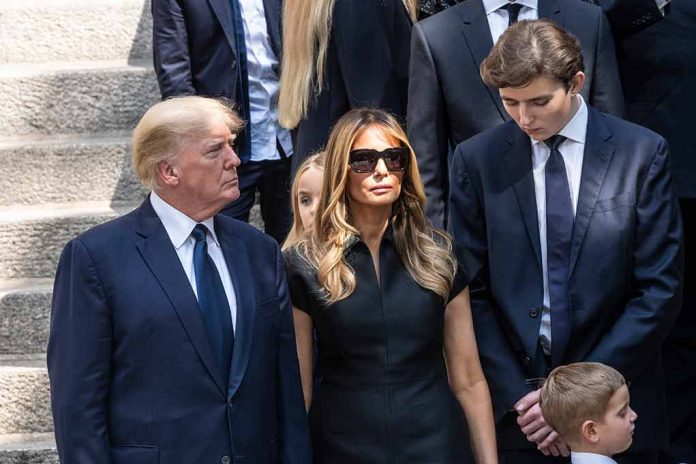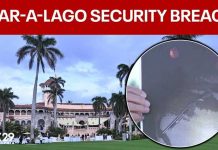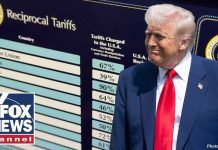
President Trump has launched an investigation into former officials who criticized him, reigniting debates about presidential authority as critics warn of dangerous precedent.
Key Takeaways
- Trump signed memorandums directing the Justice Department to investigate former officials Miles Taylor and Chris Krebs, immediately revoking their security clearances
- Both officials publicly opposed Trump’s claims about the 2020 election, with Krebs previously fired for declaring the election secure
- Trump described the Justice Department as previously “weaponized” and pledged to restore it by investigating those he views as enemies
- Trump’s actions represent a significant departure from traditional Justice Department independence and separation from presidential influence
- Critics warn these directives could establish dangerous precedents for how presidents handle political dissent and criticism
Trump’s Investigation Orders Against Former Officials
President Donald Trump has directed federal agencies to revoke security clearances and investigate two former officials who publicly opposed his claims about the 2020 election. The memorandums target Christopher Krebs, former director of the Cybersecurity and Infrastructure Security Agency, and Miles Taylor, a former Department of Homeland Security official. Krebs was fired in November 2020 after declaring the election secure through the agency’s Rumor Control website, which corrected election integrity falsehoods. Taylor was revealed as the anonymous author of a 2018 New York Times op-ed criticizing Trump’s administration.
The presidential directives describe Krebs as a “significant bad-faith actor” while accusing Taylor of “stoking dissension” and engaging in potentially “treasonous” behavior by writing about confidential meetings. In the memorandums, Trump ordered the Department of Justice to investigate both former officials’ activities and stripped them of any remaining security clearances. The actions are widely seen as an escalation of using presidential power against critics, with former officials and lawmakers expressing alarm about the precedent being set.
Judge Boasberg's daughter in the non-profit game, apparently his sister Margaret and her Bain Capital husband Christopher Bierly are also big players shoveling cash into the NGO financial underground
Scrutiny Intensifies Over Judge Boasberg’s Impartiality Amid Family Ties and… https://t.co/eV2ZyqCMB0 pic.twitter.com/qxEtctCdNy
— SubX.News® (@SubxNews) March 23, 2025
Justice Department Visit Signals New Approach
During a highly unusual visit to the Justice Department, Trump delivered a politically charged speech where he positioned himself as the “chief law enforcement officer,” a role traditionally held by the attorney general. The visit highlighted his approach to the department, which he previously labeled the “Department of Injustice.” Trump pledged accountability for perceived wrongs within the agency and promised to end what he described as its weaponization against him and his supporters. His influence was evident as he discussed the firing of prosecutors and scrutiny of FBI agents involved in investigations against him.
“Our predecessors turned this Department of Justice into the Department of Injustice. But I stand before you today to declare that those days are over, and they are never going to come back and never coming back,” Trump said.
The presidential approach marks a significant departure from historical norms that maintained Justice Department independence in criminal investigations. Trump has sought to remove potential obstacles by appointing loyalists to key positions, including Pam Bondi, who praised Trump during the visit. This restructuring of the department leadership signals a fundamental shift in how the administration views the role of federal law enforcement agencies in relation to presidential authority.
OFFICIAL RESPONSE TO PROFESSOR TURLEY ON GROWING BIDEN AUTOPEN SCANDAL
We strongly, and respectfully, disagree with Professor Turley’s response to a narrow subset of the arguments we have raised regarding the prolific use of “autopen” by the Biden White House, particularly with… https://t.co/TrzAXITNwm
— Oversight Project (@ItsYourGov) March 20, 2025
Broader Pattern of Targeting Critics
Trump’s recent directives extend beyond the two former officials. He also targeted the law firm Susman Godfrey, barring them from federal resources after they represented Dominion Voting Systems in a successful defamation lawsuit against Fox News. This action appears connected to Trump’s continued claims about the 2020 election being stolen, despite numerous court dismissals and confirmed recounts confirming President Biden’s victory. Critics of these actions argue they represent a dangerous pattern of using presidential power against perceived enemies.
“Krebs executed his constitutional and professional duty by debunking lies about the 2020 election,” Representative Himes said in an email. “That Donald Trump would wield the Justice Department against him for such an act represents yet another chilling step towards authoritarianism.”
The subjects of these investigations have responded publicly. Miles Taylor wrote, “I said this would happen. Dissent isn’t unlawful. It certainly isn’t treasonous. America is headed down a dark path.” Former Representative Liz Cheney has compared Trump’s actions to targeting political adversaries in authoritarian regimes. Legal experts suggest these directives could create potential constitutional conflicts regarding the separation of powers and the limits of presidential authority over federal agencies, especially when directed at personal political opponents.
Sources:
- https://apnews.com/article/trump-visits-justice-department-e9091e3721adda4d3ed39bd15119a0d4
- https://www.reuters.com/world/us/trump-demands-accountability-his-pursuers-justice-department-speech-2025-03-14/
- https://www.nbcnews.com/politics/national-security/trump-orders-probes-two-former-officials-defied-rcna200523



